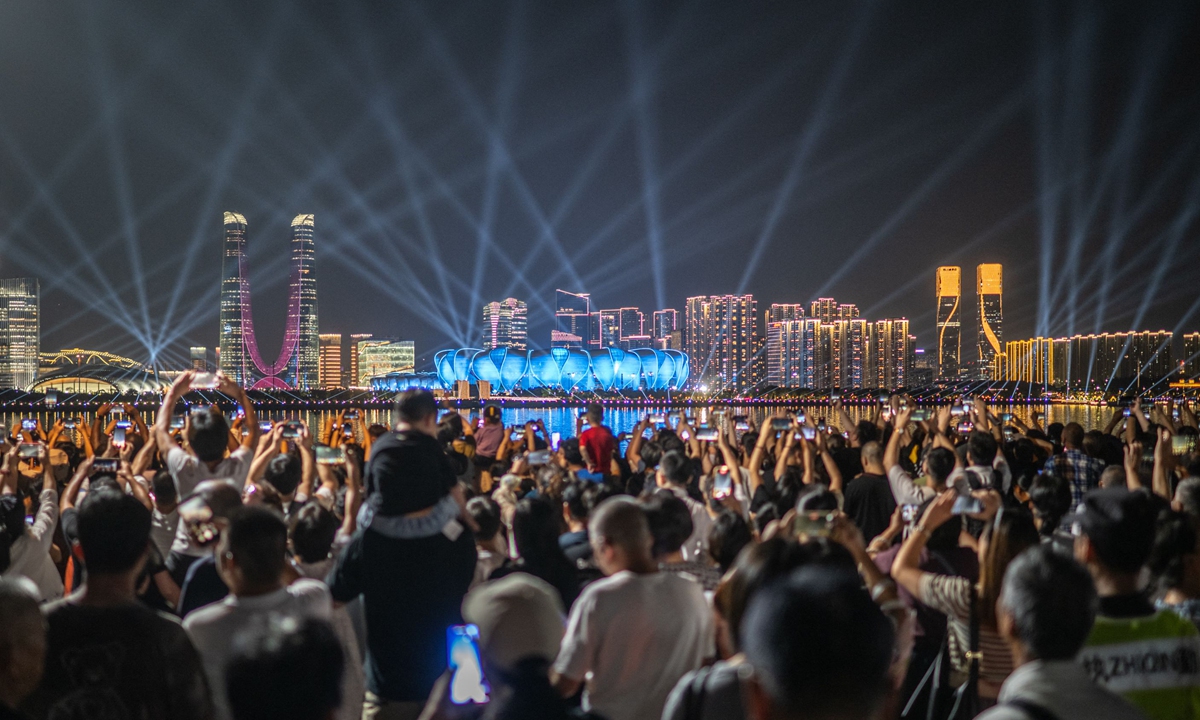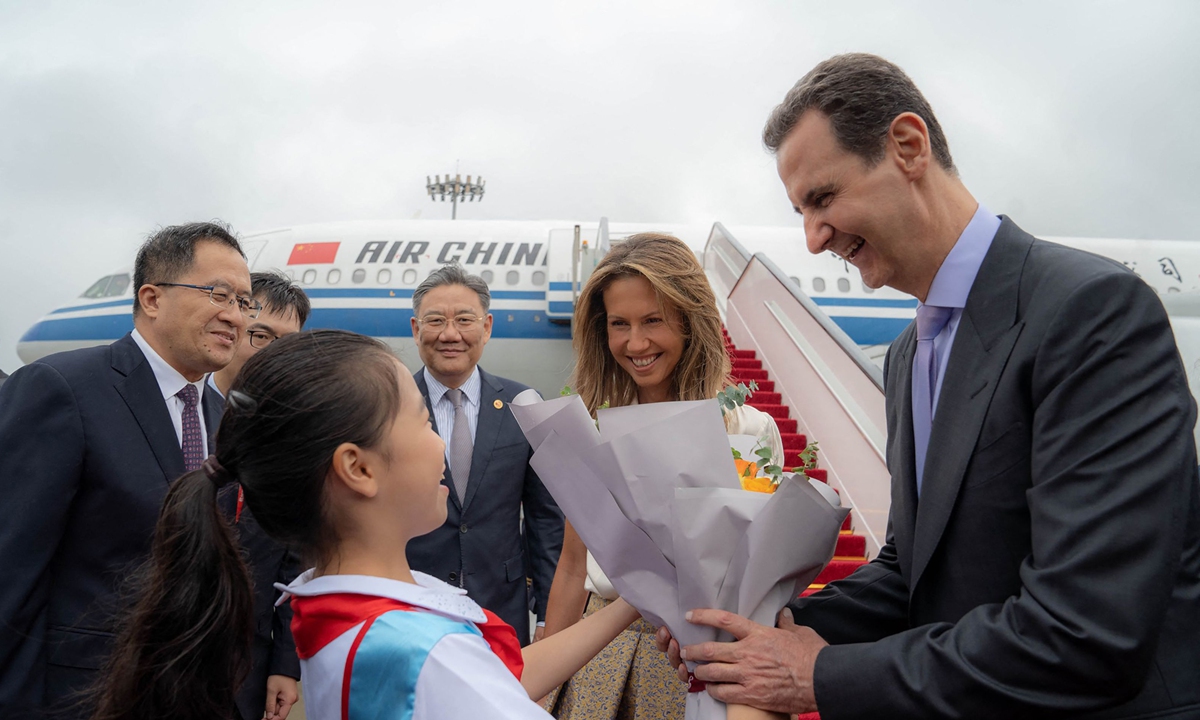
People gather at the promenade of Qiantang River to watch the light show of the Hangzhou Olympic Sports Centre Stadium (C), ahead of the 2022 Asian Games in Hangzhou in East China's Zhejiang Province on September 19, 2023. Photo: VCG
Chinese President Xi Jinping will attend the opening ceremony of the highly expected 19th Asian Games to be held in Hangzhou from Friday to Saturday and will hold a welcoming banquet and bilateral events for foreign leaders attending the ceremony, the Chinese Foreign Ministry announced on Thursday.
Hangzhou, the host city, is now under the global spotlight as it welcomes about 12,000 participants from 45 countries and regions across Asia, marking it the largest Asian Games ever.
The Games - China's first mega-event since the 2022 Beijing Winter Olympics - will not only serve as an occasion for showcasing the solidarity among Asian countries amid the frequent interference of US-led Western forces in its regional affairs, and demonstrating China's inclusiveness and openness, but will also give a new push to economic recovery, as the sports event itself is an important pipeline for stimulating economic activity in the host city, and even the host country, boosting exchanges and strengthening public confidence in its future prospects, experts said.
The launch of the Games also unveiled a major diplomatic event in China this fall. The foreign leaders attending the opening ceremony in China include King Norodom Sihamoni of Cambodia, President Bashar al-Assad of Syria, Crown Prince Sheikh Meshal Al-Ahmad Al-Jaber Al-Sabah of Kuwait, Prime Minister Pushpa Kamal Dahal "Prachanda" of Nepal, Prime Minister Xanana Gusmão of Timor-Leste, Prime Minister Han Duck-soo of South Korea and Speaker of the Dewan Rakyat of Malaysia Johari bin Abdul, Chinese Foreign Ministry spokesperson Hua Chunying said on Thursday.
In addition, the Sultan of Brunei's representative Prince Haji Sufri Bolkiah, the Emir of Qatar's representative Sheikh Joaan Bin Hamad Bin Khalifa Al Thani, Prince Faisal bin Hussein of Jordan, Princess Sirivannavari of Thailand and Deputy Prime Minister Edil Baisalov of Kyrgyzstan will attend related events, the spokesperson said.
The Asian Games, also called the Asiad, is a multi-sport event that takes place every four years. The 19th edition of the Games was originally scheduled to take place in China in 2022, but was postponed due to the COVID-19 pandemic.
"It's not only a sports event but also a major diplomatic activity showcasing the solidarity among Asian countries, and the many foreign leaders and senior officials attending the event also reflected a consensus on building a community with a shared future in Asia," Li Haidong, a professor at the China Foreign Affairs University, told the Global Times on Thursday.
Such a large-scale attendance also shows the wide recognition of China's role in international sports events and other international affairs, demonstrating those countries' willingness to coordinate and cooperate with China in promoting the cause of human progress, Li said.

A handout picture released by the official Syrian Arab News Agency shows Syrian President Bashar al-Assad and First Lady Asma al-Assad being welcomed upon their arrival at the airport in Hangzhou, capital city of ?East China's Zhejiang Province, on September 21, 2023. Bashar arrived in the scenic city to attend the opening ceremony of the 19th Asian Games to be held on September 23.?Photo: VCG
'Hangzhou is ready' On a high-speed train from Beijing to Ningbo, East China's Zhejiang Province, passing through Hangzhou on Thursday, passengers, especially young people, enthusiastically discussed various details of the upcoming Games, including the opening ceremony performances and participation of star athletes. Travelers heading to other destinations expressed their envy of those heading to Hangzhou.
Although it was a rainy Thursday in Hangzhou, the city, fondly nicknamed "Heaven on Earth," remains vibrant, with painted advertisements featuring the three cute Asian Games mascots, while enthusiastic volunteers filled "Smile Volunteer Service Kiosks" inside the airport and train stations.
On the streets, Hangzhou residents held a variety of umbrellas and smiled at the guests on the Games' shuttle buses. Everything in this city indicates to the outside world that Hangzhou is ready and looking forward to greeting the big event, echoing the city's slogan "Be a good host and welcome the Asian Games."
A staff member at the Asian Games Village told the Global Times at the media village on Thursday that since the Asian Games Village opened on September 16, journalists from about 60 to 70 media outlets have been checking in every day.
"We expect to receive journalists from more than 100 media outlets registering at the village every day for the next three days," she said. "Although the pressure may increase, we are confident in successfully completing this first phase of reception."
Crown Prince of Kuwait Sheikh Mishal Al-Ahmad Al-Jaber Al-Sabah, Syrian President Bashar al-Assad and Prime Minister Xanana Gusmao of Timor-Leste arrived in Hangzhou on Thursday, and were warmly welcomed by Chinese officials and the public at the airport.
"The backdrop of the 19th Asian Games is the current escalation in geopolitical conflicts and the involvement of external countries, such as the US-led West, in Asian affairs. These external actors are attempting to stir up geopolitical divisions in Asia," Song Wei, a professor at the School of International Relations and Diplomacy at Beijing Foreign Studies University, told the Global Times on Thursday.
"This also strengthens the collective resolution to oppose external disruption. Meanwhile, China is demonstrating to Asia an attitude of inclusiveness, equality, and openness based on the spirit of sportsmanship," she said.
West's bad-mouthing to fail Athletes will compete for a total of 483 gold medals in 40 sports and 61 disciplines over 15 exhilarating days of competition. But while the world's attention has been focused on Hangzhou, some Western media have been bad-mouthing the grand sporting event by claiming that there has been "low enthusiasm" for the Games and huge spending on the stadiums.
Reuters ran a story on Thursday saying "a glum mood hangs over China's Asian Games," saying that the new stadiums and other gleaming facilities "reflect misplaced priorities" when the economic and social atmosphere in China as well as confidence are at a low after the three-year pandemic.
It's not the first time that some Western media outlets have bad-mouthed China's major sports events such as the Beijing Summer Olympic Games in 2008 and the Winter Olympics in 2022. Some experts said this reflects their "sour grapes" mentality, especially when sluggish post-pandemic recovery is an issue that not only China has been facing, but one that challenges the whole world.
Western public opinion is clearly cooperating with Western politicians on China-related issues. Whether in sports or diplomacy, they try to belittle or weaken China's global image and influence by misinterpreting those events and the public sentiment, Li noted.
"Sports events are a very important means of stimulating the economic vitality of the host city and even the host country, and to strengthen international exchanges. In contrast to those media reports, there have been high expectations for the Games and its ability to boost economic recovery and enhance the public's confidence in the future," the expert said.





